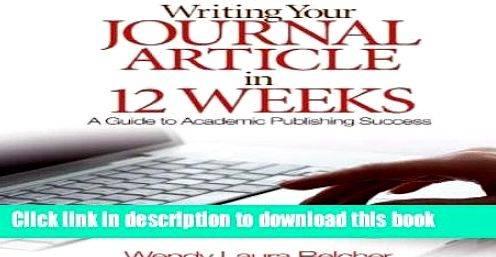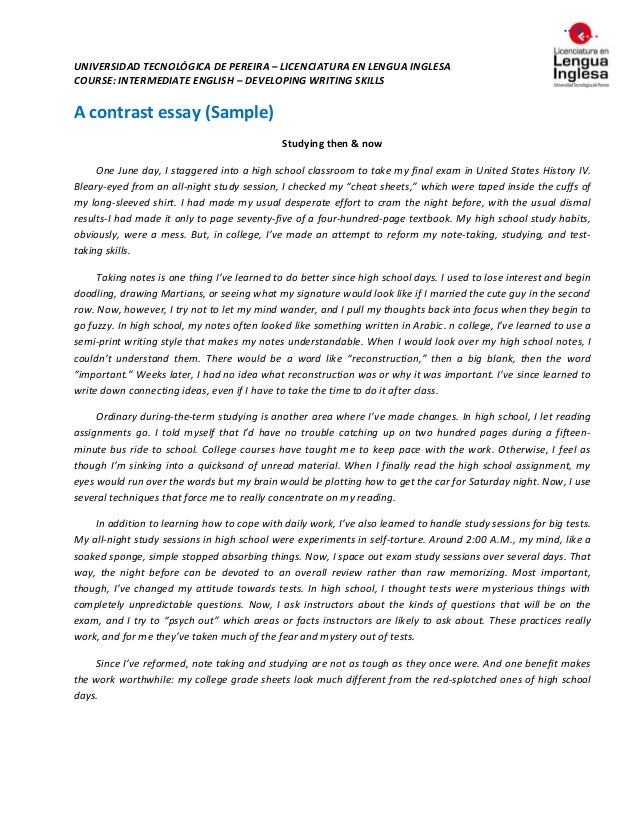
Wendy Laura Belcher's "Writing Your Journal Article in Twelve Weeks: A Guide to Academic Publishing Success" is a revolutionary approach to enabling academic authors to overcome their anxieties and produce the publications that are essential to succeeding in their fields/10(51) Writing Your Journal Article in 12 weeks: A Guide to Academic Publishing Success Writing Your Journal Article in 12 weeks: A Guide to Academic Publishing Success By Week 11 on wrapping up and Week 12 on sending your article may also be conflated in days (so it’d be 9 weeks to a journal article). Why do I like the Belcher book? Because I find the 12 weeks approach (similar to a quarter system when I teach) manageable and doable
Writing Your Journal Article in 12 Weeks – Dr Richard Huysmans
The best-selling writing workbook by Wendy Laura Belcher, now in its second edition! The writing workbook requires you to write information and answers in various boxes and forms in the book. If you want to preserve your book without marks, however, you can use the Writing Your Journal Article in Twelve Weeks Formswhich have been posted as pdfs to enable you to use them repeatedly.
They are listed according to which chapter each appears in. I also have posted there instructions for the Belcher Editing Diagnostic Test for Chapter The first edition of the writing workbook was translated into three languages; new translations will be coming for the second edition so far—Spanish, simplified Chinese, and traditional Chinese:. Many use the writing workbook to teach courses and workshops for graduate students and faculty. If you would like to learn more writing your journal article in 12 weeks how to do this, see How to Teach a Journal Article Writing Class.
There, you will find a form to fill out to request a syllabus. Gump, Review in Journal of Scholarly Publishing. Burright, Review in CHOICE: Current Reviews for Academic Librarie s. There are many such texts out there that are of high quality, but this one proves itself a level above.
All aspects of writing, ranging from psychological difficulties one can meet to work organization to how to formulate an argument, are covered.
PhD students as well as college and university professors will benefit from it when comes the time to write academic documents, articles, conference papers, and books. It is written in plain language, it is funny, there are a ton of useful practical tips based on real experiences, and it gives you a sense of belonging to a community.
I believe this book will become a classic, and staple in its field, that can be used in many areas of study.
Each week, readers learn a particular feature of writing your journal article in 12 weeks articles and work on revising theirs accordingly. At the end of twelve weeks, they send their article to a journal. This invaluable resource is the only guide that focuses specifically on publishing humanities and social science journal articles.
Writing Your Journal Article in Twelve Weeks can be used individually or in groups, and is particularly appropriate for graduate student professional development courses, junior faculty orientation workshops, post-doc groups, and journal article writing courses. Wendy Laura Belcher is professor of African literature at Princeton University in the Department of Comparative Literature and Center for African American Studies.
She has taught journal article writing workshops in North America, Europe, and Africa. General instructions : Using the print or electronic version. Completing tasks. Following disciplinary tracks and stage pathways.
Using the workbook according to your temperament; by yourself; in a writing group; with a writing partner; with coauthors; or to teach a class or workshop. Some publishing terms and processes: What is a journal? What is writing your journal article in 12 weeks article? What processes do journal articles go through? Giving feedback to author.
WEEK 1: Designing Your Plan for Writing Instruction : Understanding feelings about writing. Keys to positive writing experiences: successful academic writers write; read; make writing social; persist despite rejection; and pursue their passions.
Your tasks: Designing a plan for submitting your article in twelve weeks. Day 1, reading the workbook. Day 2, designing your writing schedule. Day 3, selecting a paper for revision. Day 4, rereading your paper to identify revision tasks.
Day 5, setting up your writing site, citation software, and file backup system; addressing coauthorship; and reading a journal article. WEEK 2: Advancing Your Argument Instruction : Myths about publishable journal articles: being profoundly theoretical, packed with ideas, and entirely original. What gets published and why: how publishable articles pair evidence and approaches. What gets rejected and why: perfectly acceptable articles and those with no argument.
Understanding and making arguments: what is an argument; how do you know whether you have one; how do you make strong arguments; and how do you write an argument-driven article? Your tasks : Organizing your article around your argument. Day 2, testing out your argument. Day 3, reviewing your article for argument. Days 4—5, revising your article around your argument. WEEK 3: Abstracting Your Article Instruction : Abstracts as a tool for success.
Ingredients of a good abstract: good SciQua and HumInt abstracts. Your tasks: Crafting an effective abstract. Writing your journal article in 12 weeks 1, talking your way to clarity about your article. Day 3, reading strong articles in your field. Day 4, writing your journal article in 12 weeks, reading articles to cite in your article. Day 5, getting feedback on and revising your abstract.
WEEK 4: Selecting a Journal Instruction: Good news about journals. The importance of picking the right journal. Types of academic journals: nonrecommended, debatable, and preferred publishing outlets. Your tasks: Finding suitable academic journals. Day 2, searching for journals. Days 3—4, evaluating academic journals. Day 5, reading relevant journals and writing query letters. WEEK 5: Refining Your Works Cited Instruction : Reading scholarly texts.
Types of scholarly texts: primary, original, or exhibit sources; scholarly or secondary literature; and derivative or tertiary documents. Advice for scholars at resource-poor institutions. Strategies for getting reading done: reading theoretical literature; related literature; and original, writing your journal article in 12 weeks, primary, or exhibit literature.
Day 2, evaluating your current Works Cited list. Day 3, identifying and reading any additional works. Day 4, identifying your writing your journal article in 12 weeks point into the related literature. Day 5, writing or revising your related-literature review.
WEEK 6: Crafting Your Claims for Significance Instruction : On the difference between arguments and claims for significance. Types of feedback: what to do and not do when giving and receiving feedback.
Your tasks : Claiming significance. Day 3, writing and inserting your claims for significance. Days 4—5, revising your article according to feedback received.
WEEK 7: Analyzing Your Evidence Instruction : Analyzing evidence. Types of evidence: textual; qualitative; quantitative; and experimental. Your tasks: Revising your evidence. Day 2, highlighting and analyzing your evidence. Day 3, analyzing the quality, relevance, and placement of your evidence. Day 4, analyzing your interpretation of your evidence. Day 5, collecting additional evidence. WEEK 8: Presenting Your Evidence Instruction : Presenting evidence in SciQua articles, in HumInt articles, and in illustrations; obtaining image or text permissions, writing your journal article in 12 weeks.
Your tasks: Revising your presentation of evidence. Days 2—4, revising your presentation of evidence. Day 5, checking your presentation of evidence by section. WEEK 9: Strengthening Your Structure Instruction : On the importance of structure. Types of journal article macrostructures: SciQua; HumInt; disciplinary; and synaptic macrostructure.
Types of pre- and postdraft outlining. Your tasks: Revising your structure. Day 3, making a postdraft outline of your article. Days 4—5, restructuring your article, writing your journal article in 12 weeks.
WEEK Opening and Concluding Your Article Instruction : On the importance of openings: fashioning your title; molding your introduction; and choosing your name. On the importance of conclusions. Your tasks: Finalizing your opening and conclusion. Day 1, reading the workbook and revising your title. Day 2, molding your introduction. Day 3, molding your introduction and choosing your name. Day 4, revising your abstract and author order. Day 5, constructing your conclusion.
WEEK Editing Your Sentences Instruction : The nature of microrevising.
What to think about before writing a journal article
, time: 2:14
Wendy Laura Belcher's "Writing Your Journal Article in Twelve Weeks: A Guide to Academic Publishing Success" is a revolutionary approach to enabling academic authors to overcome their anxieties and produce the publications that are essential to succeeding in their fields/10(51) Writing Your Journal Article in 12 weeks: A Guide to Academic Publishing Success Writing Your Journal Article in 12 weeks: A Guide to Academic Publishing Success By Week 11 on wrapping up and Week 12 on sending your article may also be conflated in days (so it’d be 9 weeks to a journal article). Why do I like the Belcher book? Because I find the 12 weeks approach (similar to a quarter system when I teach) manageable and doable

No comments:
Post a Comment